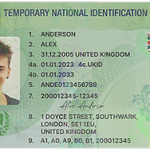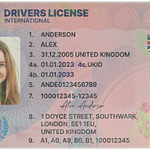Online dating has become a popular way for people to meet potential partners in the digital age. However, it also brings with it a dark side – the prevalence of online dating scams. One of the more insidious tactics employed by scammers is the use of fake ID cards.
### How Fake ID Cards are Used in Online Dating Scams
Scammers often create false identities to deceive their victims. They use fake ID cards as a means to add an air of authenticity to their fabricated personas. For example, they might claim to be a professional in a certain field, such as a doctor or an engineer, and use a fake ID card with a forged name, photo, and professional – related details to back up their claims.
These fake ID cards can be used in multiple ways during the course of an online dating scam. In the initial stages, when communicating with their targets on dating platforms, scammers may send pictures of the fake ID cards to gain the trust of the other person. They might say things like “I want to prove that I am who I say I am” or “Here’s my ID so you know I’m legitimate.” This gives the victim a false sense of security, making them more likely to open up and engage further.
As the relationship progresses, scammers may use the fake ID cards in more elaborate ways. For instance, they might claim to be in a financial bind and need help. They will use the fake ID as part of their story, saying that because of their supposed identity (e.g., a businessperson facing a sudden financial setback), they need the victim to transfer money to them. They may even provide details on the fake ID, such as the address or the supposed place of work, to make their story seem more real.
### The Process of Creating Fake ID Cards for Scams
There are various ways scammers obtain or create fake ID cards. Some purchase them from illegal vendors on the dark web. These vendors offer a wide range of fake documents, including ID cards, with varying levels of sophistication. The more advanced fake ID cards may have features like holograms, magnetic strips, and even barcodes that seem to match the real – thing at first glance.
Others may create fake ID cards using photo – editing software and basic printing equipment. They start by finding a suitable photo of someone (often stolen from social media or other online sources), then use software to manipulate the image and add the necessary text and details, such as name, date of birth, and ID number. After printing, they may laminate the card to give it a more professional look.
### The Impact on Victims
Victims of online dating scams involving fake ID cards can suffer in multiple ways. Financially, many fall prey to the scammers’ money – making schemes. They may transfer large sums of money under the false pretense of helping their supposed partner in need, only to realize later that they have been swindled.
Emotionally, the impact can be even more devastating. Victims often develop genuine feelings for the scammer, believing they are in a real relationship. When they discover that everything was a lie, they may experience feelings of betrayal, humiliation, and depression. This can also have a long – lasting impact on their trust in others, both in online and offline relationships.
### How to Protect Yourself from Such Scams
1. **Verify Identity**: Don’t just take a scammer’s word for it when they present a fake ID card. Try to independently verify their identity. For example, if they claim to be a professional, you can check with relevant professional organizations or their supposed place of work. However, be cautious as scammers may also create fake contact information for these supposed organizations.
2. **Look for Red Flags**: There are often tell – tale signs that someone may be a scammer. For instance, if they ask for money very early in the relationship or if they have inconsistent stories about their life. If the ID card looks too perfect or has some unusual details, it could be a sign of a fake.
3. **Use Video Calls**: Regular video calls can help you get a better sense of the person. Scammers may be reluctant to engage in video calls as they don’t want their true identity to be revealed. If they keep making excuses for not being able to have a video call, it should raise suspicion.
4. **Research Online**: Do a thorough online search of the person’s name, the details on the ID card, and any other information they have provided. You may find that their photo has been used elsewhere, or that the details they gave don’t match up with what’s publicly available.
### Common Problems and Solutions
**Problem 1: Difficulty in Spotting a Fake ID Card**
Many people are not well – versed in the features of real ID cards, making it hard for them to tell if an ID is fake. Real ID cards have specific security features such as holograms, microprinting, and UV – reactive inks.
Solution: Educate yourself about the security features of your local ID cards. You can visit the official website of the issuing authority to learn about these features. Also, compare the ID card in question with a real one you have (if possible). If the ID card has missing or inconsistent security features, it could be fake.
**Problem 2: Falling for Emotional Manipulation by Scammers**
Scammers are often skilled at emotional manipulation. They can create sob stories that tug at the heartstrings of their victims, making them more likely to send money despite any doubts about the ID card’s authenticity.
Solution: Keep your emotions in check when dealing with someone you met online. No matter how compelling their story may seem, take the time to think rationally. If someone is pressuring you to send money, especially in an urgent manner, it’s a major red flag. Consult with a trusted friend or family member before making any financial decisions.
**Problem 3: Lack of Awareness about Scammers’ Tactics**
Some people are simply not aware of the various tactics scammers use, including the use of fake ID cards. They may be new to online dating and assume that everyone on the platform is genuine.
Solution: Do some research on common online dating scams before getting involved. Read articles, watch videos, and learn from the experiences of others who have been scammed. Online dating platforms also often have resources and tips on how to stay safe. Make sure to familiarize yourself with these resources.
**Problem 4: Scammers Creating Elaborate Back – stories**
Scammers don’t just rely on fake ID cards; they also create elaborate back – stories to make their identities seem more real. They may have fake social media profiles, friends, and even fake documents related to their supposed life events.
Solution: Look for inconsistencies in their back – story. For example, if they claim to have a certain job but can’t answer basic questions about it, or if their social media profiles seem too new or have very few connections. Cross – reference the information they provide across different platforms and ask for more details if something seems off.
**Problem 5: Difficulty in Reporting Scammers**
Victims may not know how or where to report scammers who use fake ID cards in online dating scams. This can lead to scammers getting away with their illegal activities and continuing to target others.
Solution: Most online dating platforms have a reporting mechanism. Use this to report any suspicious activity or users. Additionally, you can report the scam to your local law enforcement agency. Provide them with all the evidence you have, including the fake ID card pictures, chat logs, and any financial transaction details. Law enforcement agencies may be able to investigate and take appropriate action against the scammers.
In conclusion, the use of fake ID cards in online dating scams is a serious issue that can cause significant harm to victims. By being aware of the tactics scammers use, learning how to spot fake ID cards, and knowing what to do if you suspect a scam, you can protect yourself from becoming a victim. Stay vigilant, trust your instincts, and take the necessary precautions to ensure a safe and enjoyable online dating experience.


